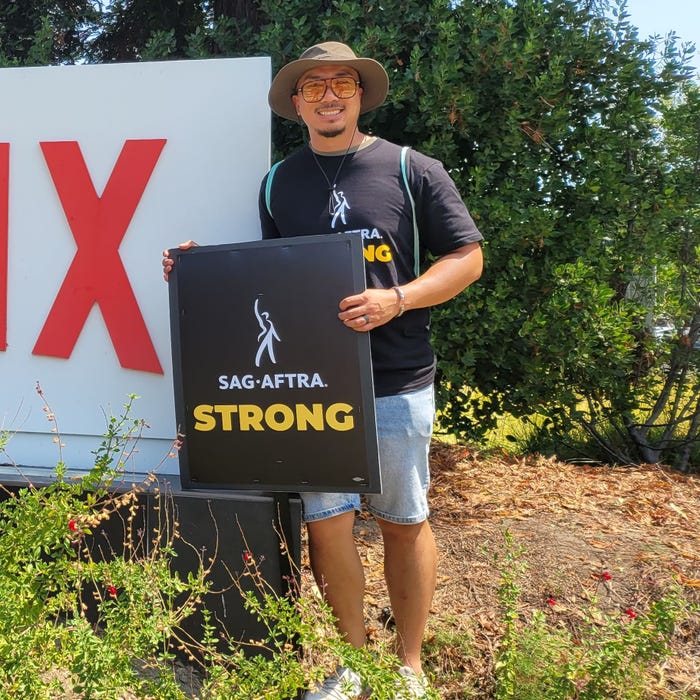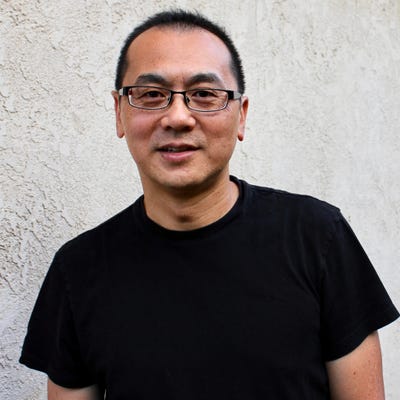Actors Strike Over AI: A Glimpse of Workers' Future?
As actors and writers picket studios over AI and other issues, is this a precursor of human vs. machine fights to come?
.png?width=850&auto=webp&quality=95&format=jpg&disable=upscale)
At a Glance
- Actors and writers are on strike against Hollywood studios and streaming services. One key sticking point: use of AI.
- Artists are concerned that studios will use AI facsimiles of them in movies and TV shows - without adequate compensation.
- The writers union has reached a tentative agreement but it is not yet official. The actors union remains on strike.
Brian D. Lai is an aspiring actor and screenwriter who has performed in independent films, TV series and theater productions, and is finishing a TV script that he wants to pitch. At the end of September, he plans to move from the San Francisco Bay Area to Los Angeles to pursue a Hollywood career.
But instead of practicing his lines, he joined a picket line in front of Netflix’s headquarters in Los Gatos, Calif. recently as part of the Screen Actors Guild – American Federation of Television and Radio Artists (SAG-AFTRA) strike against Hollywood studios. Both sides disagree on many issues but a key one revolves around the future of his profession: Hollywood’s increasing use of AI to create digital facsimiles of actors without formalizing adequate compensation.
The 37-year-old’s day job as a software developer gives him a unique perspective on artificial intelligence and its pros and cons. “AI is inevitable. I see both aspects of it,” Lai said. “My take on AI is that we should use it as a benefit to humans.”

Brian D. Lai picketing outside Netflix HQ.
However, he worries that AI will reduce opportunities and impede his efforts to break into the entertainment industry.
Hollywood studios reportedly are pressuring background actors to digitally scan their faces and bodies, leading to concerns that studios will pay the actors once and use their digital likenesses in future productions as a cost-saving measure. Actors want protections as part of a new contract.
“Everyone is concerned about (studios) just blatantly stealing somebody’s likeness,” Lai said. “How does anyone get into the industry if you can’t even become a background actor? You start as a background actor. That’s how you find out if you can cut it. That you can work 12- to 14-hour days and perform when needed.”
The fight over AI in Hollywood
The writers and actors unions are battling with Hollywood studios and streaming services in a months-long labor dispute over pay, working conditions and AI. They view AI as an existential threat to their livelihoods, from AI-generated scripts to the use of digital replicas of actors, and they want assurances that AI won’t put them out of work.
For example, actress, writer and filmmaker Justine Bateman recently wrote a column warning that the industry could easily to train an AI model on the existing seven seasons of her 1980s hit TV series Family Ties to create an eighth season. The strikes have shut down nearly every scripted production.
Voice actor Tim Friedlander, who stars in the Netflix animation series “Record of Ragnarok” and is president of the National Association of Voice Actors (NAVA), said the AI threat is real. Voice actors get hired for dubbing work, animation, video games, audio books, documentaries and in-show narration, but they also do e-learning and corporate work.
He has heard of three voice actors who have had their voices hijacked, stolen or used without permission. One voice actor discovered her voice was used in TV promos that she never recorded. Another actor’s voice was synthesized by AI and used in a video game. A third actor was essentially told by a company that it has three years of voice audio recorded and “we don’t need you anymore.”
“The concern is when it’s done without our consent, without our control and without compensation,” Friedlander said. “We want to ensure that human voice actors are not replaced by synthetic versions of themselves. We’ve seen it happen multiple times. It’s not happening on a large scale, but one voice actor who loses a job to a synthetic version of him or herself is one voice actor too many to lose work.”
SAG-AFTRA, which also represent voice actors, want exactly that: informed consent and fair compensation if studios want to digitally replicate and use actors’ voices and likenesses or change their performances using AI.
The Alliance of Motion Picture and Television Producers (AMPTP), which represents studios and streaming companies, argues that their proposal would protect performers’ digital likenesses. SAG-AFTRA chief negotiator Duncan Crabtree-Ireland reportedly disputes that claim, accusing studios of wanting to scan background performers, pay them one day’s pay, “own that scan … and use it for the rest of eternity.”
Bay Area actress Solana Paz, a SAG-AFTRA member, wants an AI deal that’s fair. The biggest stars have their own lawyers and can negotiate AI protections into their contracts, but the other 95% are vulnerable, she said.
“I have nothing against AI. I love so many uses of it, but what I don’t like is the abuse of AI,” she said. “We’re just asking for fairness. If you want to use my image over and over in different projects, great. Do it. You first have to ask me for permission, and second, you have to pay me for it.”
Can Generative AI replace writers?
On the writing front, the Writers Guild of America (WGA) is not entirely opposed to AI as long as writers do not lose jobs or are otherwise properly compensated by studios. However, training the AI models using existing content is another matter.
A major challenge with using generative AI to write content is that the work is derivative of previous work and may not result in innovative and more inclusive, diverse storytelling that pushes the boundaries, said Joshua Glick, a visiting associate professor of film and electronic arts at Bard College.
“They look backwards. They look to what has been written. They look to what can be scraped, absorbed and analyzed, and the result or the product does not necessarily speak to the kind of creativity, the kind of innovation that comes with bold thinking,” Glick said. “The kinds of films and TV shows that might involve marginalized actors and actresses, people who might not be bankable box office stars, but nonetheless, the kind of films or TV shows that might be genre-bending, that speak to socially engaged issues or issues of social justice.”
The use of previously written content to train AI models remains a major sticking point in contract negotiations. The AMPTP makes it clear in its latest contract proposal that studios plan to use AI-produced scripts, but it recently made some concessions, saying generative AI-produced material will not affect writers’ compensation and credit. For example, if a company asks a writer to rewrite a script produced by generative AI, the writer will be paid for a screenplay, not a lower rate for a rewrite. The AI-produced material will also not be considered source material when determining the writer’s credit, the proposal state
This past Sunday, a tentative deal was reached between the studios and the two branches of the Writers Guild of America “in principle on all deal points, subject to drafting final contract language.” The writers’ union said the deal was “exceptional” with “meaningful gains and protections for writers in every sector of the membership.” It declined to release any details until the contract is written and signed. The union leadership will vote on it as early as Tuesday.
The actors' union remains on strike.
Acting and writing careers at stake
Entertainment attorney Schuyler “Sky” Moore, a partner at Greenberg Glusker, a law firm whose clients include entertainment companies, actors, writers, directors and producers, said studios want to take advantage of AI because it is fast and saves money.
Moore, who has written and spoken about AI issues in Hollywood, said studios can potentially create digital actors to star in movies in the future, which would replace human actors.
“You literally have this capacity where you don’t need writers or actors. You can literally replace them. This is existential,” Moore said. “It’s not going to be long before AI can create the entire film, writing the treatment and the screenplay and creating the visuals and creating the characters. The technology is getting better and better.”
That’s what worries actors and writers. It’s their livelihoods at stake.
They invest a lot in their careers, honing their craft with constant acting, voice or scene study classes, maintaining and updating marketing materials such as headshots and websites and purchasing technology to optimize submissions, including camera set-ups required for self-tapes during the COVID lockdowns, said actress Sharline Liu.
Currently, SAG-AFTRA members must earn $26,470 over four quarters to be eligible for health insurance. “The average working actor struggles to reach that threshold to get health insurance. It’s constant freelance work,” said Liu, whose screen credits span two decades and includes “Ally McBeal,” “Criminal Minds,” and most recently “13 Reasons Why.
In her 30 years as a SAG-AFTRA member, she has qualified for health coverage only two years. Like most actors she has had to pursue other jobs to make a living. The UC Berkeley grad has worked full-time administrative positions in the entertainment industry, which has given her health benefits.
Today, when Liu pursues acting roles, it is mostly for live theater opportunities, which are not under SAG-AFTRA’s jurisdiction. But when SAG-AFTRA held a protest recently at Netflix headquarters, she joined in to support her on-camera acting colleagues.
.png?width=970&auto=webp&quality=80&disable=upscale)
Credit: Wylie Wong
Actor Robert Chestnut was among them. When “Matrix Resurrections” was filmed in San Francisco in 2020, some background actors were pulled aside to have their likenesses scanned. They asked Chestnut, but he declined. He’s been a SAG-AFTRA member since the early 1980s and knew better than to have his face and body scanned, but he saw many younger actors do it, and he is concerned whether their digital replicas will be used in the future without pay.
Nearly 32,000 people worked as background actors last year, making up 20% of the 160,000 SAG-AFTRA members, according to Variety. As extras, they are the union’s lowest paid workers, making $187 a day, and have the least control over their likeness, the publication said.
Beyond using digital replicas of background actors, Chestnut is concerned that AI will take work away from principal actors who have speaking roles. Movie and TV productions need to reshoot scenes sometimes, which results in more income for actors.
“If they have to re-do scenes and pull you back, it’s more work for you and helps you make a living,” said Chestnut, a Carmel-by-the-Sea, Calif. resident.
Rather than bring actors back for reshoots, Chestnut is concerned that studios will instead use the digital replicas of the actors to change scenes or use AI to generate synthetic versions of the actors’ voices to change the dialogue. If studios do use AI for these purposes, actors want fair compensation and residuals, he said.
Paz – who said she’s loved performing since she was a child – quit her job as a graphics designer eight years ago to pursue acting full-time. Today, she has worked mostly in independent films, but is also busy doing commercials.
She likens the AI debate to a graphics designer who has designed a logo for a website or app. People who want to use that design must license it and pay the designer. “This is no different,” she said.
Where will AI take Hollywood in the future?
AI and entertainment experts say it’s too soon to know the full ramifications of AI to storytelling and screenwriting in Hollywood in the future. The movie and TV industry uses AI today, but their usage is still in its early stages.
“It’s hard to paint a picture of what the future looks like because small changes can lead to large shifts,” said Rowan Curran, a Forrester Research analyst, who specializes in AI and machine learning.
Today, studios use AI to de-age actors like Harrison Ford in the latest Indiana Jones movie. And while TV and film have long used CGI for visual effects, AI-powered tools allow them to easily build crowd scenes, such as populating stadiums or creating massive armies. In some cases, like in the ��“Ted Lasso” TV show, they used a mix of background actors and digital doubles of actors to fill out scenes.
If studios use AI-generated scripts, Hollywood will always need writers to perfect scripts and ensure content is engaging and will resonate with audiences, experts say.
“Understanding the human experience is quite critical,” said Anthony Palomba, assistant professor at the University of Virginia’s Darden School of Business.
Writers can also use generative AI as a writing assistant, Curran said. Independent screenwriters may not have a big writing team, so they can use large language models to iterate, edit and revise their writing. They can also use generative AI as a fact-checking tool to ensure their scenes are error-free, he said.
Palomba, who does research on how audiences consume entertainment and the use of technology among entertainment and media firms, likens Hollywood’s AI debate to the invention of cameras and the advent of photography in the 1800s.
Artists who painted argued that photographers undermined their art and that photographs had no creativity, but photography created more jobs, which can happen with AI, he said.
“In deploying AI across the entertainment process, I think there are going to be new jobs. I don’t think we know what those are, but it involves creativity,” Palomba said.
Eventually, as the technology improves, some studios may get bold and produce movies or TV shows purely using AI. But in the meantime, the technology is still glitchy and people are still needed, he said. “AI is not able to run by itself.”
The use of AI in Hollywood is very much a philosophical debate about humans vs. AI. One side argues that AI can’t replicate the creativity and emotions that humans can bring. The other side of the argument is that AI can outdo humans.
Stay updated. Subscribe to the AI Business newsletter.
As entertainers and studios try to hash out their AI differences, government and the court system could also get involved.
For example, comedian Sarah Silverman and other novelists have sued ChatGPT-creator OpenAI for copyright infringement for ingesting their books to train their AI models. SAG-AFTRA also supports federal legislation for a federal right of publicity statute that protects people’s names, likenesses and images, Friedlander said.
It is difficult issue for Hollywood to resolve because of the continued advances in AI and all the potential use cases.
“Trying to police it will be very hard to do because it is moving so quickly,” Curran said. “The regulations you set up today will probably not be very helpful in a year’s time.”
In the meantime, by going on strike, actors and writers have made their voices heard, shining a light on their issues with AI.
While the industry tries to resolve their differences, NAVA, the non-profit voice actor organization with 700 members, is giving advice to its members on how to negotiate contracts with AI protections built in. They developed a rider for their contracts that includes language that says clients cannot use their voice actors’ recordings to create synthetic versions of their voices or for machine learning.
Some voice actors have found success negotiating the AI protections into their new contracts, said Friedlander of NAVA. One actor recently refused a voice acting job because the company would not agree to the AI language in the rider. Soon after, the company caved in and the actor took the job, he said.
“It’s the power to say no. It’s hard, but it’s powerful,” Friedlander said. “We are not anti-AI. We are pro-voice actor. The technology is here. We just don’t want to be left behind.”
Lai said workers in every industry will face the threat of AI. Actors and writers are simply among the first to tackle the hard questions about AI. “AI is going to spread and affect all industries. Corporations are going to see how far they can push it, and how (much) they can take from humans,” he said. “Artists are at the forefront of this. We are fighting for our future. We are fighting for everybody’s future.”
Read more about:
ChatGPT / Generative AIAbout the Author(s)
You May Also Like


.jpg?width=700&auto=webp&quality=80&disable=upscale)
.jpg?width=700&auto=webp&quality=80&disable=upscale)
.jpg?width=700&auto=webp&quality=80&disable=upscale)
.jpg?width=300&auto=webp&quality=80&disable=upscale)

.jpg?width=300&auto=webp&quality=80&disable=upscale)
.jpg?width=300&auto=webp&quality=80&disable=upscale)
.jpg?width=300&auto=webp&quality=80&disable=upscale)